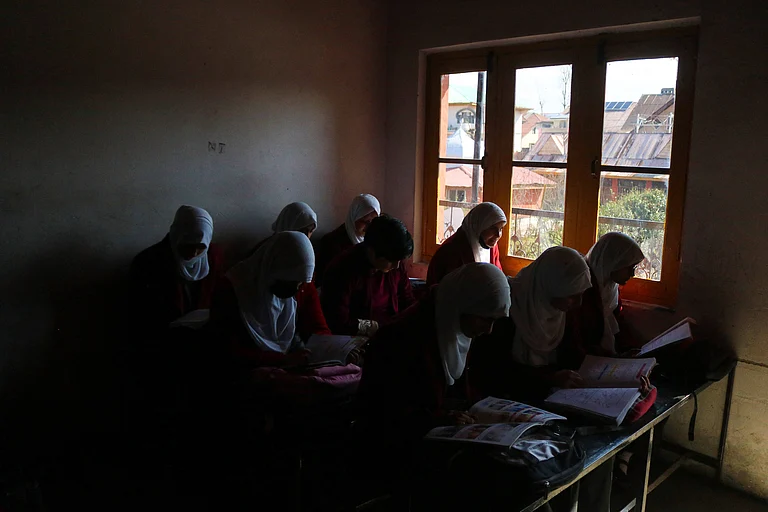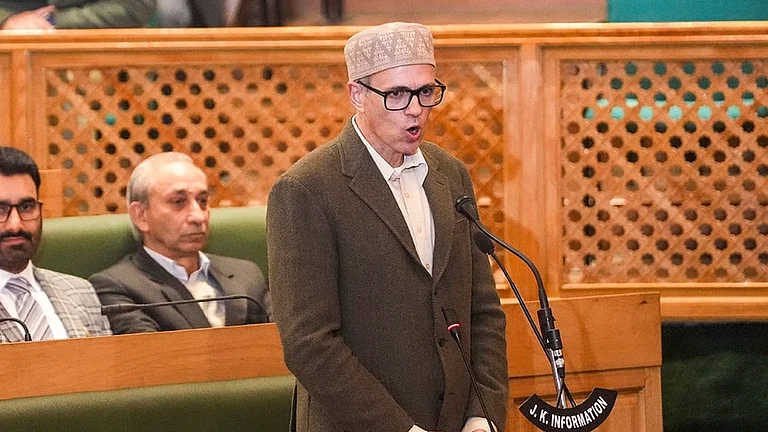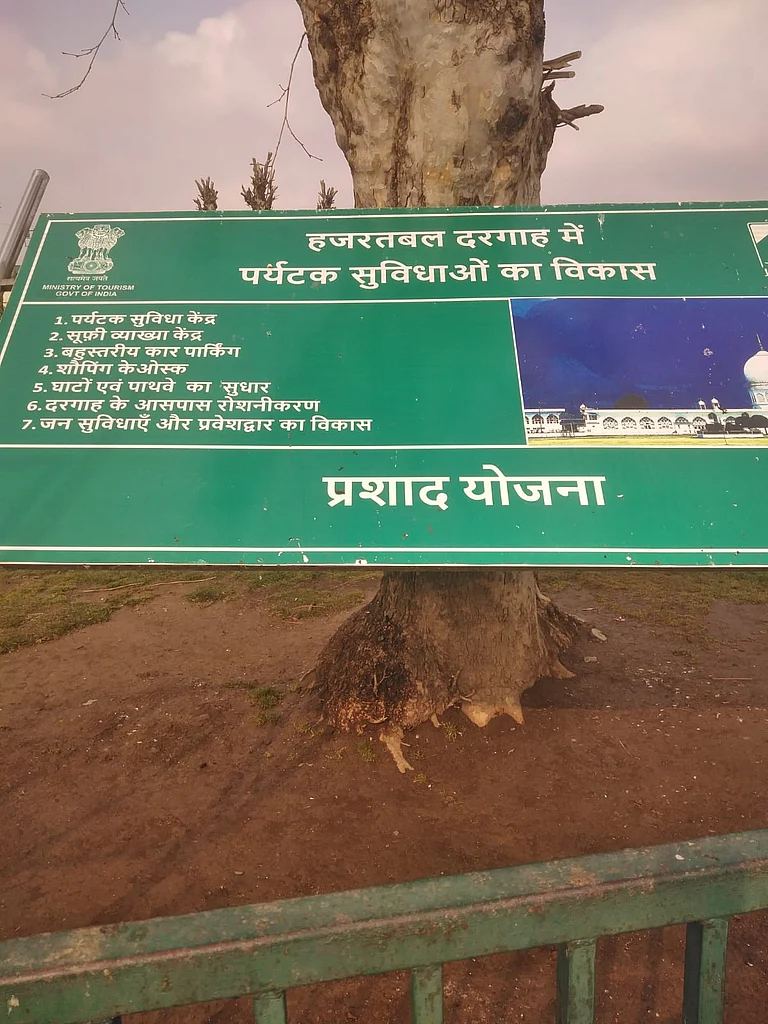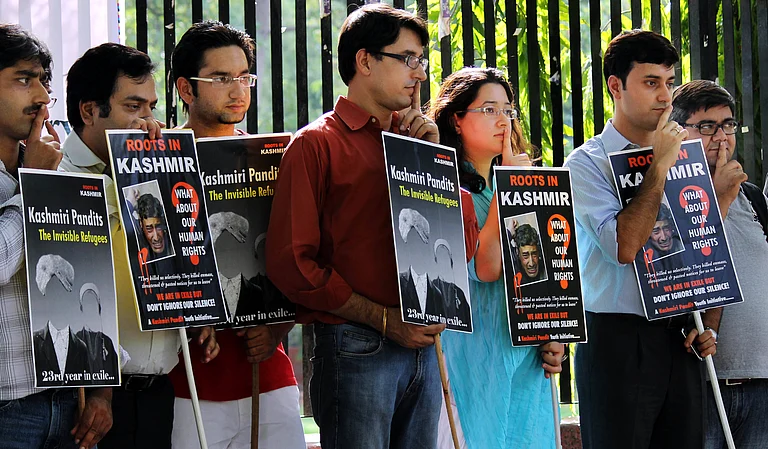On the morning of January 23, discussions revolved around Kashimir’s prolonged dry spell at a bakery shop in the heart of Budgam, a central district in Kashmir. Only two customers were present, and Mohammad Ashraf, 40, the baker, was quietly nodding in agreement with an elderly customer’s observations on the arid conditions and the scarcity of snow in the Valley along with its lasting impact on agriculture.
When the customers left, I prodded Ashraf about his views on politics and Prime Minister Narendra Modi. I did not expect an answer from him. But he did not shy away from the topic.
“Modi is a good man,” said Ashraf, looking straight into my eyes. Two of his colleagues were also present — a young boy extracting bread from the tandoor (a large, urn-shaped oven made of clay) and another person, around 45, was kneading the dough. Ashraf, however, was enjoying his morning salt tea near the edge of the Tandoor.
Ashraf added, “Modi provides the health card and it benefits hundreds of people. He also gives Rs 1,000 to Rs 1,500 to the elderly people every month.”
Ashraf cited the example of an elderly man in his village, Kremshar, who will not listen to anything against Modi as he receives Rs 1,500.
Outside a private hospital in Srinagar, a man said his close relative had appendicitis and then developed related complications. “We got him operated in this hospital and we did not have to pay anything. These things matter,” said the man. The Ayushman Bharat PM-JAY SEHAT scheme, launched in 2020, extends the benefits of the Ayushman Bharat PM-JAY to all residents of Jammu and Kashmir. This scheme offers free insurance coverage, providing a financial cover of up to Rs 5 lakh per family.
When some scheme comes to your help when you are worried sick, as patients and attendants in hospitals are, it is expected to leave an impression on the mind. So many Kashmiris —like Asraf— connect the policy to the politician whose imagery is omnipresent.
A doctor at a private hospital says the Ayushman Bharat scheme has led to the growth of private hospitals in J&K. He says people are availing of its benefits and are preferring private hospitals over government hospitals and they give credit to Modi. “But it is just a scheme and the government is feeling the burden of it. Now, they are putting a cap on surgeries, even asking eye specialists in private hospitals that they can do only five surgeries in a day,” says this doctor.
However, away from Srinagar, at the tourist hub of Gulmarg, hoteliers agree with the government that they see a huge rush of tourists even in the dry season. But their larger concern is about “our place in Gulmarg”. “For the past five years, the government has not extended the lease of our hotels. We fear these hotels can be taken from us anytime,” says a hotelier.
The hoteliers in Gulmarg and Pahalgam who had taken lands on lease in 1978 are on tenterhooks after an order issued by the Lieutenant Governor’s administration in December 2022 asked them to “hand over the possession of the land taken on lease, failing which the outgoing lessee shall be evicted”. For the past five years, hoteliers of Gulmarg and Pahalgam have been asking for extensions on their leases. They are not sure when their properties in Gulmarg will be up for auction.
In Srinagar’s lower court, a lawyer was taken aback when asked about his views on the Bharatiya Janata Party (BJP) and Modi. Summing up the current mood of the silence in Kashmir, he says, “In these days, who asks such questions and who expects an answer to this and that too in Kashmir. I will speak on the condition that you will not quote me and I will try to give you a safe answer. But you will still not quote me,” says the lawyer. Then, after sipping his tea in his chamber, he looked at his junior colleagues and started talking.
He says, “Let me tell you like this: the BJP government is good for the rest of India but not for Kashmir. We were disrobed on August 5, 2019, when Article 370 was abrogated and, since then, our relations with the government have completely changed. It is not of a citizen and the state. We don’t know when they will come up with which law that will further marginalise us.”
The lawyer says a large section of people have indeed benefited from the Ayushman health insurance scheme and other schemes of the government but he doubts it has changed their opinion about the current government’s Kashmir policy. “Health cards are not a replacement for the democracy we had. It is not a replacement of the sense of security about land and demography which you had in the state of J&K before August 2019,” he says.
In the deeply politicised society of Kashmir, the residents, much like any other part of the country, do not shy away from availing of amenities or government services. However, when assessing the popularity of the party or a leader it is the interplay of political narratives and collective memories that shapes their preferences.
Kashmiris today recognise omerta —imposed or otherwise— on speaking their mind about the politics of their place. They can talk about roads, water, and hospitals, but, if they talk about democracy, it will raise eyebrows. A senior human rights lawyer told me when I met him outside his office: “Kashmiris today fear the government like a beauty fears a man who pursues her maddeningly and dangerously. She is afraid to let him look into her eyes, for he may find out the truth buried in her heart and not like it.”
A regional political leader says: “Kashmiris don’t want the government to know that they hold that truth dear or that they bear it in their hearts. That can cause all sorts of problems for them. They know that the developmental work, appreciated as it is, is no substitute for democratic and political rights.”
Ashraf summed up this sentiment. Despite his unwavering faith in Modi’s health scheme and other initiatives, he said he has never voted and will not vote in upcoming elections. “Why should I vote? Kashmir is a different issue.”
“It is only post-2019 politics around Muslims in mainland India that has begun leaving its imprint on Kashmir, a departure from the past when events like the 1992 Babri demolition had minimal impact here,” says a political analyst, pleading anonymity.
The analyst adds, “While historical events like the Babri Masjid demolition did not evoke a reaction in Kashmir, presently, for the first time, Kashmiris are grappling with feelings of insecurity and apprehension as trouble seems to be encroaching closer to home.”
In the ever-evolving landscape, predicting how Kashmir would respond to any popularity test remains challenging. However, one thing appears certain — the BJP, even after the abrogation of Article 370 and downgrading the region into a Union Territory and high on its ‘development agenda’ in Kashmir, is unlikely to get any favour as the regional political leaders argue.
“If the BJP is confident of winning polls in J&K, it should have conducted elections. It is the elections the BJP is shying away from. Even the panchayat and local bodies are not now in place as their term ended on January 9 this year,” says National Conference Spokesman Imran Nabi Dar.
PDP leader Mohit Bhan says earlier separatist political parties would call for a boycott on participating in the elections, asking people to remain away from it. “Now, the job is done by the ECI as it is not holding polls in J&K Assembly for the past five years,” he adds.
While talking about expectations placed on Modi, Bhan says, “To be honest, it was expected that Modi as Prime Minister, given the resounding mandate he received, will tread the path of Atal Bihari Vajpayee on Kashmir.”
Bhan says the political leadership in Kashmir had hoped for Modi to actively contribute to and advance the Kashmiryat-Jamhooriyat-Insaaniyat narrative of Vajpayee. However, he opted to align himself solely with a particular section of the population, adds Bhan.
Bhan further says, “The ‘Dil Aur Delhi Ki Doori’ became a hollow slogan as the people of J&K found themselves relegated to the status of second-class citizens. This was done by dismantling all constitutional institutions, leaving them with the unsettling realisation that if the Mother of Democracy treats its citizens like this, perhaps it is better to live in anarchy where at least there are no expectations.”


























